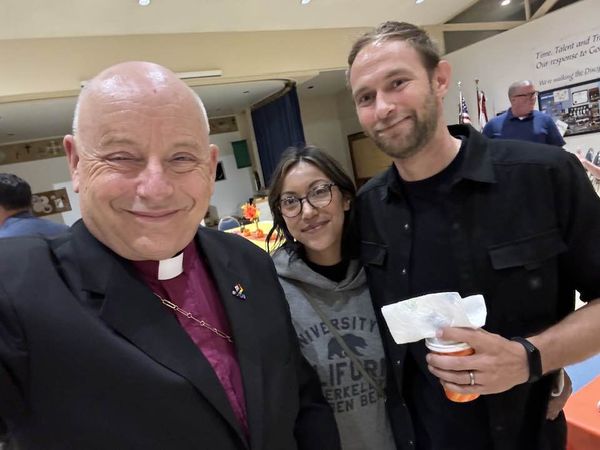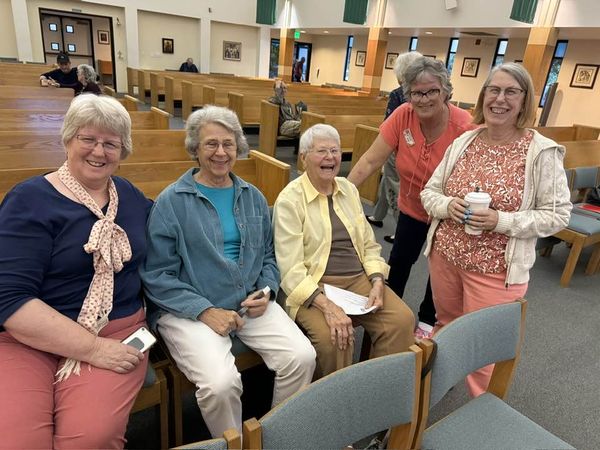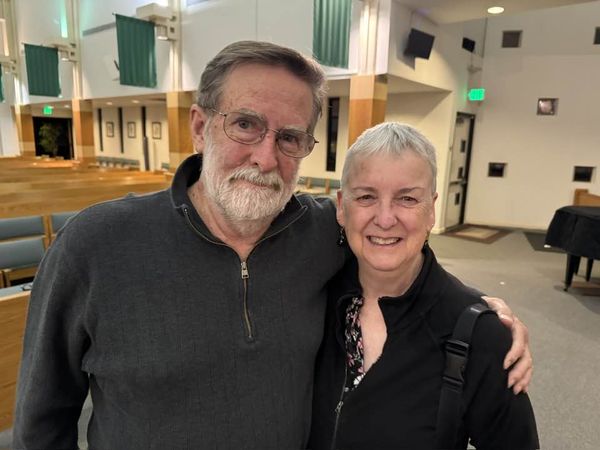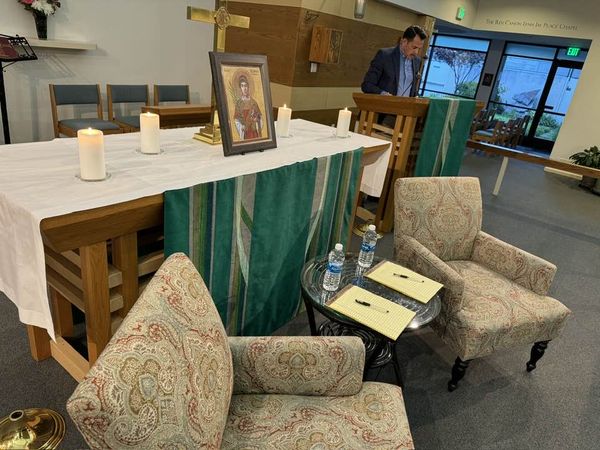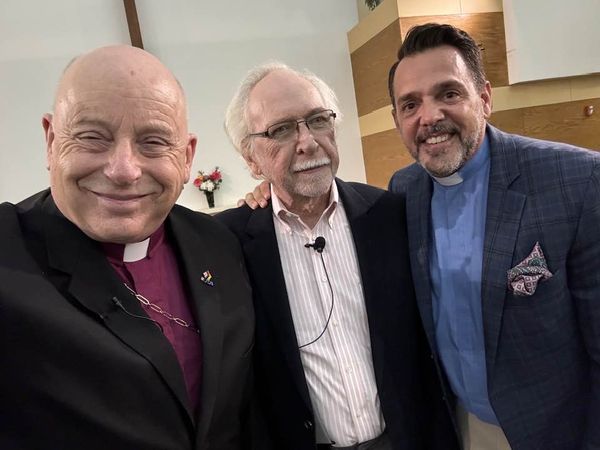
I know Jack and Christopher share my profound feeling of humility as we rise to talk about the crisis in Israel and Palestine. No one on our program is competent to express the view of the Israeli or the Palestinian or indeed of the United States Jew or Palestinian American.
St. Stephen’s could have staged such a conversation, which would have ended up as a vigorous and probably an overboiling debate. Whether it would have been possible or availing is anyone’s guess. The fog of war has settled over the interfaith organizations of which I’m a part in and around Los Angeles. Our relationships are deeply strained. Between the propositions that Israel has the right to defend itself and that noncombatants in Gaza have the right to be free from deadly attacks has opened a chasm of non-negotiability.
Across which St. Stephen’s invites us all to extend ourselves tonight as living bridges of reconciliation, with no standing, most of us, except our caring and our canon. Our subject is the Christian’s response to the tragedy. Non-Palestinian Christians have no skin in the game besides our whole being in Christ. We’re irrevocably invested because our story began in Bethlehem and Nazareth and came to completion in Jerusalem. Scripture readers, hearers, preachers and teachers, sometimes pilgrims – I’ll make my tenth visit in January by the grace of God – the Prince of Peace invites our preoccupation with a land where earthly princes would appear to be permanently at war.
So I’ll rely on our reliable biblical canon, namely a brief verse from the third chapter of 1 John: “Children, let us love, not in word or speech, but in truth and action.” In these words, I hear two rebukes right off the bat – first, that my gospel understanding may tend to be childlike, so humility is again a watchword, and second, that talk is sometimes cheap. The short verse also offers three themes that are integral parts of our Christian formation – love, understanding, and action.
Beginning with love, and its imperative of respect for the dignity of every human being, our founding principle that all people in Israel and Palestine are entitled to peace, freedom, security, and national self-determination. I doubt if anyone in this space disagrees. But powerful forces are devoted to depriving Palestinians and Israelis of their inherent rights. Netanyahu, and Hamas and its Iranian sponsors, envision an end game that doesn’t include a Palestinian state or a Jewish state, respectively. So believe it or not, we’re all beginning in the middle, if we believe in self-determination for both nations. We’re moderates in a crisis dominated by extremists who harbor essentially genocidal or at least nation-ending aims.
As for understanding, getting into the realm of understanding uncomfortable truths, I’ll offer two.
The first is that Zionism began and persists in instability and presents a moral and practical challenge for each of us. After centuries of antisemitism and genocide, we had better at least try to understand the Zionist impulse. Yet a Jewish homeland in Palestine, where non-Jews had also lived for centuries, was always going to entail bloodshed. Same with a white European homeland in 18th century North America, where indigenous people had lived for centuries.
But Israel was established. It was recognized by the international community. It built a mighty economy and military. It is more of a democracy than any other nation in the region. Millions of our Jewish neighbors in the United States feel safer so long as Israel is safe, because antisemitism remains a fact of their daily lives.
To have this conversation with understanding, each of us must ask ourselves if we believe Israel retains the right to exist as a Jewish state. If we do not – and one is entitled to take that view — how do we think Israel as currently constituted will end, as long as we are safe in the assumption that Israel will neither voluntarily relinquish nor negotiate away its Jewish identity? Israel isn’t going anywhere. Forcefully ending Zionism, or expecting someone else to end it, would entail incalculable bloodshed. And that cannot be the Christian’s prayer.
A second uncomfortable understanding is that almost no Palestinian believes in Israel’s right to exist as a Jewish state. Why in the world should they, if their grandparents’ land was taken in 1948? They can still climb a mountain and see their family’s town or farm.
One of the many ironies of the crisis is that both sides have the same slogan, “From the river to the sea.” That’s the Jordan and the Mediterranean, of course. Far-right settler parties mean Israel should annex the West Bank to restore biblical Israel, where Palestinians wouldn’t be safe. With 750,000 settlers now living on the West Bank, that project of de facto annexation is well underway. Annexation without extending the vote to Palestinians in the West Bank and Gaza would finally earn Israel the distinction of pursuing an apartheid policy. Palestinians and their supporters on college campuses also say “from the river to the sea,” but they mean the opposite. They mean a single majority Arab state, which Israelis of course take to mean the destruction of the Jewish state.
So here’s the rub at St. Stephen’s Santa Clarita. We say we want peace, and we really do. But in the region, almost no one in power wants peace except on terms completely unacceptable to the other side. The two great and awful truths about the Gaza war is that both sides have committed crimes against humanity, and both sides have done so to try deprive the other of the right of national self-determination.
Our third theme is nevertheless action — not others’ actions, which we cannot change, but ours, because according to 1 John, the Christian must always act in love and truth. So in closing, here are my humble suggestions.
Pray daily, read widely, and resist binary, zero-sum answers.
Visit the region if and when you can.
Support American Friends of the Episcopal Diocese of Jerusalem, which in turn supports al-Alhi Arab Hospital in Gaza.
As we do in The Episcopal Church, if you are an investor or serve on an investment committee, support divestment from companies that do business in settlements in the occupied West Bank or support Israeli security measures there.
Urge your congressional representatives to work on behalf of the two-state solution, require the U.S. to condition military aid to Israel’s willingness to return to the peace process, and get us into conversation with Iran again so that we can bring pressure to bear to end its support of Hamas and Hezbollah.
Finally, believe in the two-state solution. You have to, because almost no one else does. The two-state solution is impossible and imperative. If Christian love requires national self-determination, and the Jewish state isn’t going anywhere, then there has to be a Palestinian state. It’s impossible, as peace in Northern Ireland was said to be impossible, as the end of the Cold War was impossible. I sat at Richard Nixon’s knee most days for most of the eighties. If I’d told him in 1982 that the great twilight struggle with the Soviets would be over by 1992, he’d have laughed in my face. It’s always impossible – until everyday people such as you and I grow so weary of hatred and bloodshed that they’re willing at last to try.
[My opening remarks at a forum on the Gaza war organized on Monday evening, Sept. 17 by the Very Rev. Christopher Montella at St. Stephen’s Episcopal Church in Santa Clarita. The other, wiser panelist was Jack Miles, Pulitzer Prize-winning author of “God: A Biography” and senior warden of Episcopal Church of the Messiah – Santa Ana, CA.]
